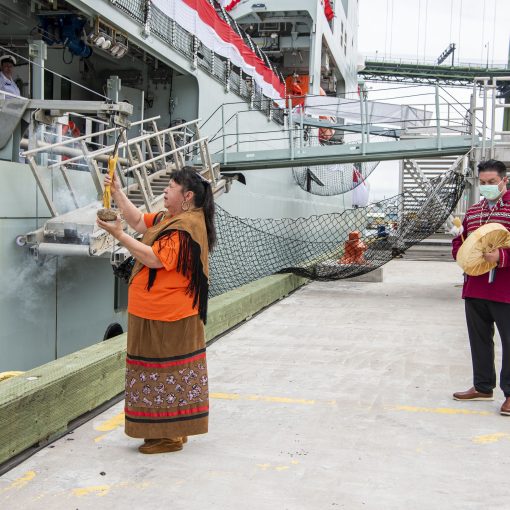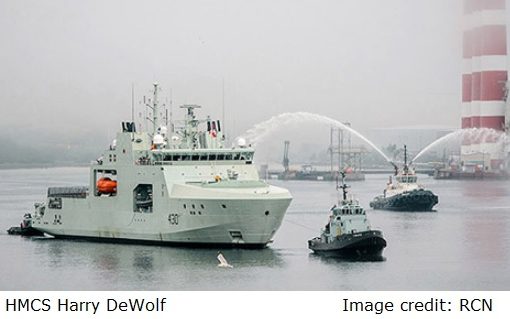A number of commentators in this forum have proposed to take the crews from the MCDVs and move them into the A/OPVs with the assumption that this will be fairly easy and relatively painless as compared to manning them with 'scarce' regular force talent. Alternatively others have suggested that the Naval Reserve man these vessels in addition to the MCDVs leaving the regular force to man the 'combat' ships. As a long serving Naval Reserve officer who has commanded both an MCDV and an NRD I can point out that this conversion from MCDV to A/OPV is not as easy as it seems and offers no cost savings what so ever and I have my doubts about additional tasking for the Naval Reserve. But before I get into that analysis I think a few points should be made about the regular/reserve terminology made in various posts.
Since the introduction of the MCDVs in the middle 90's the term 'Naval Reserve' has become increasingly meaningless. The vast majority of Naval Reservists who actually man the MCDVS are from a cadre of approximately 1500 or so personnel who are for all intents and purposes in the regular force. Few of these people have civilian careers worth mentioning and most have long since abandoned any university programs that they may have once embarked on. They have to a large extent moved to either coast, Quebec City (where Naval Reserve HQ and CFFS(Q) are located) or Ottawa and are permanently stationed there. They are by and large uninvolved with the part-time reserves. Instead they move from one three year 'contract' (or posting) to another with some eye towards maintaining a sea/shore balance to their careers. When posted to sea-going billets they are paid precisely what their regular force counterparts are paid and are entitled to all of the benefits associated with the regular force including a recently introduced pension plan. There is no cost saving associated with these reservists.
The training received by the naval reserve is, as previous commentators suggested, largely the same as that found in the regular force. In point of fact an increasing number of 'reservists' in this full-time cadre are in fact ex-regular force who for one reason or another have decided to leave the regular navy. So arguably their training is identical. However the issue here lies with the required qualifications of the MARS officers onboard the MCDVs as well as other trades. Currently most MCDV COs have what is called a 'Minor Warship Command Qualification' which allows them to command vessels of up to approximately 2000 tons (i.e. think about the old HMCS Cormorant). The watchkeepers have a similarly identified qualification and neither has ice-specific training as with regular force MARS officers. If these vessels are as heavy as the SVALBARD class then these officers may not be qualified to serve on them.
The difference in watchkeeping/command qualifications for MCDVs is largely due to the fact that they are not formally trained (i.e. unless they have transferred to the regular force) in handling the complex operations of a frigate's Ops Room but are trained for the somewhat more simple issues found in the ops room of an MCDV. That is not to say that they have not gained experience in various exercises but a more meaningful operations training programme will have to be developed to equip these officers for the tasks at hand. The A/OPV as discussed will probably not have the complex ops room of an FFH/DDH but some sort of additional training and/or experience may be required to convert these MCDV officers. The exact specifications of the vessel are unknown but the navy may have to re-think how they define a 'reserve' BWK if the A/OPVs are as heavy as imagined by some.
Next and by far the most difficult training issue lies with the engineers onboard MCDVs. These are not the Diesel Mechanics as found on a FFH/DDH or AOR but are in fact Marine Engine Systems Operators (MESOs). While they receive much of the same introductory training as the Regular Force they do not receive the longer training in diesel theory and repair skills their counterparts receive. The training difference can be as long as 18 months for a more junior engineer and presumably more for a Engineering WK or a CERA. The real problem is that these are precisely the skills that will be required by the engineers of the A/OPVs as they operate far from logistical and maintenance bases (i.e. in the Arctic). I was recently informed that for a MESO to stand watch on an ORCA (which is intended to operate solely on Canada's west coast and rarely to leave sight of land) MESO's would have to undergo 18 months of additional training at CFFS(E). Imagine how much more will be necessary for a vessel which spends at least half of its life thousands of miles away from any sort of meaningful repair facility. Finally the ET's and NET's onboard are all drawn from the same scarce regular force pool.
All of the equivalent trades in the Regular Force (i.e. MARS, Diesel Mechanic etc) have been described in various navy documents as being in 'crisis'. Arguably since we do not have a formal plan for the DDH replacement yet (if ever) and even when it is announced it will be some time before delivery I would suggest that it would be somewhat more cost advantageous to de-commission the Tribals and man these vessels with already qualified regular force sailors. In all likelihood a mix of so-called reservists and regular force personnel will be required.
On the other side of this coin the Naval Reserve Divisions (NRDs) scattered across the country are finding it increasingly difficult to recruit, retain and maintain any sort of sea keeping skills whatsoever. The challenges facing the CF recruiter have been commented on and discussed ad nauseum, suffice to say they are no easier for the NRD than they are for any one else with the additional challenge of having no organic operational role or sea-going task to maintain people' s interest in the NRD while they undergo their basic and initial trades training (not to mention the retention of more senior personnel). The attrition rate for relatively new entry naval reservists in NRDs is high and likely to remain so in the foreseeable future. Furthermore in my experience as a CO of an NRD I found very few so called 'full-time' reservists willing to transition back to the 'part-time' world and fewer still who were capable of the time management skills required. In point of fact in my three years in command I was just as likely to have a regular force sailor transfer to the part-time side of the navy as a full time reservist and their retention rates once required were about the same.
In fact the part-time Naval Reserve has been slowly depleting its sea-going resources to man the MCDVs over the last ten years. Most NRDs in this country are in fact challenged and some have been permanently damaged by the advent of the 'full-time' manning concept behind the MCDVs. Less than half are capable of generating their own leadership and must rely on augments from either the regular force or the 'full-time' reserve to even function as recruiting centers. In 2006 only six of 24 NRDs had a part-time, locally generated and located command team (i.e. CO, X) and Coxswain) all others relied upon this augmentation. The average age of part-time MARS officers, MESO's and other 'hard-sea' trades is steadily increasing and most NRDs have relatively few qualified sea-going personnel in their part-time ranks. To add to the complexity of these issues is the fact that a substantial source of recruiting for the regular force comes from the cadre of full-time reservists. So you may want to send a 'reserve' sailor on a long arctic mission in a desolate part of the world on an A/OPV which his regular force counter part has no interest in. His/her response may well be to transfer to the regular force and join that frigate deployed to the Middle East. His or her NRD will have no one available to replace them on the A/OPV.
In short, the idea that the 'Naval Reserve' is either going to able to take on the additional task of manning the A/OPVs while manning the MCDVs or alternatively is going to quickly transition to the A/OPVs is in my opinion overly optimistic and I believe relatively simplistic. The 'part-time' navy in particular has paid a heavy price to man the MCDVs and as such there is no large base to draw from as there was in the 1990s. More realistic manning scenarios will have to be developed with an eye towards a more sustainable approach.



